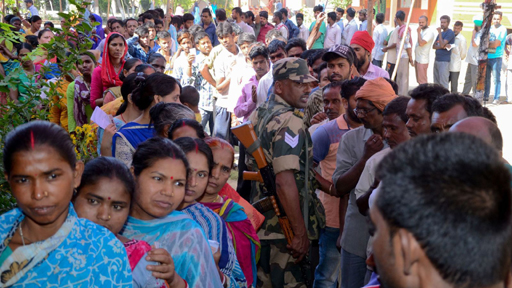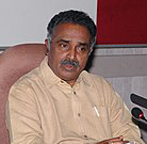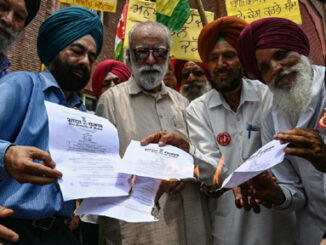

The idea of simultaneous elections, to the Lok Sabha, the State Assemblies and the local bodies, was thrown up by the Prime Minister a couple of years ago. Frequent Assembly and local body elections kept him busy on the campaign trail in some parts of the country most of the time. This experience may have been the trigger for the idea to hold elections at one time.
This also led to the formation of a high-level committee on simultaneous elections, which was headed by the former President of India, Ram Nath Kovind. Other members of the committee included the Home Minister, Amit Shah, former Leader of the Opposition in the Rajya Sabha Ghulam Nabi Azad, former Chairman, Fifteenth Finance Commission N.K. Singh, former Secretary-General, Lok Sabha Subhash C. Kashyap, senior advocate Harish Salve and former Chief Vigilance Commissioner Sanjay Kothari. Minister of State (Independent Charge) Ministry of Law and Justice Arjun Ram Meghwal, was a special invitee. The committee’s report was submitted to the President of India in March this year. Thus, the recommendations were available to the public before the 2024 general election. Moreover, the idea of ‘simultaneous elections’ was a part of the ruling Bharatiya Janata Party’s manifesto (BJP) for this general election. If the ruling party had won a majority in this election it could have claimed that the idea had been endorsed by voters. But in the absence of a majority, it becomes difficult to assume that voters are in approval of it.
Be that as it may, it is nothing less than a miracle that a high-level committee could come up with such a voluminous report (18,626 pages) within a relatively short time on an issue of great importance. With the Union Cabinet having approved the recommendation, the subject of ‘one nation one election’ has reached almost take-off stage. In the first phase, Lok Sabha and Assembly elections will be held simultaneously, while local body elections will be conducted within 100 days of the general election.
An amendment Bill and its fate
The recommendation on simultaneous elections involves amendments to various Articles of the Constitution. The crucial amendment is on the tenure of Assemblies which will no longer have fixity. Since the tenure of the Assemblies will have to be synchronized with that of the Lok Sabha, it is only natural that State Assemblies, which, under Article 172, have a fixed tenure of five years will lose it.
But before going into further details, let us look at what the fate of the Constitution amendment Bill that will be introduced in the 18th Lok Sabha for this purpose will be. After the Bill is introduced, the next important stage is its consideration, which means a general debate on it. After the debate is concluded, the motion for consideration is put to the vote of the House. At that stage, the special majority, namely, the majority of the total membership of the House and a majority of not less than two-thirds of the members present and voting, will be required.
Only if the motion for consideration is passed with the special majority will the House consider the subsequent stages, i.e., clause by clause consideration, and finally pass the Bill. If all 543 members are present in the House to vote then the support of 362 members will be required. It is understood that the ruling National Democratic Alliance has around 292 members at present. Thus, there is a wide gap between this number and the special majority number of 362. Since the Opposition parties are opposed to the ‘one nation one election’ proposition, perhaps the government will find it extremely difficult to mobilize the special majority. Thus, in such a situation, the fate of the Constitution amendment Bill will be decided at the stage of consideration itself. The simple message from all this is that without the support of the Opposition, no Constitution amendment Bill will be able to be passed in the Parliament of today.
The arguments are thin
The high-level committee has recommended simultaneous elections for two reasons. First, the issue of savings in expenses given the humongous amounts of money spent in each election. If all elections are held only once in five years the savings will be enormous. But this is an argument that needs closer examination. Under Article 324, all elections to Parliament and the State legislatures are conducted by the Election Commission of India (ECI). The money required to hold elections is sanctioned by Parliament as a part of the Budget. For the financial year 2023-24, the total allocation made by Parliament to the ECI is ₹466 crore. Obviously, this allocation was made for meeting the expenditure in connection with the 2024 general election. For 2022-23, the total allocation was only ₹320 crore. Thus, the total amount allotted to the ECI for the general election — ₹466 crore — is not a very huge amount.
Of course, expenditure is incurred also by the State governments to meet logistical requirements in connection with elections. Under Article 324(6), staff are required to be provided to the ECI on demand for the elections. Under Section 160 of the Representation of the People Act, 1951, State governments are empowered to requisition premises and even vehicles for election purposes. All these arrangements require money which the States will have to provide. But even after all these expenses are also considered, the total expenditure incurred by the Union and State governments cannot be categorized as being huge or enormous.
Yes, the money spent by the political parties is mind boggling, but the point is that the money that would be saved by the political parties due to the holding of elections once in five years is not going to be spent on, for example, road building or the building of bridges or hospitals. No political party has ever done such things. After all, we had simultaneous elections from 1951-52 to 1967. There is no evidence that the political parties have ever built roads for instance during this long period. Therefore, the assumption that the money saved can be used for building infrastructure does not seem to be based on any empirical evidence.
The second reason is that frequent elections will disrupt developmental plans and projects of the government because of the model code of conduct being in force most of the time. Once again there is no empirical evidence to prove this argument. After all, periodic or frequent elections have been held since 1967 till today. But it is not known that elections have stopped the developmental momentum. It is interesting to note in this context that demonetization of 85% of India’s currency was done close to the Uttar Pradesh Assembly election.
A move against federalism
Curtailing the tenures of State Assemblies to synchronize them with the tenure of the Lok Sabha is an act against federalism. Under the Constitution of India, State Assemblies are autonomous law-making bodies within the India federation and are independent of the federal parliament. A fixed tenure of the Assemblies independent of the tenure of the Lok Sabha is a key aspect of the federal setup. Under the Kesavananda Bharati decision, Parliament does not have the power to alter the basic structure. Federalism is a part of the basic structure. The proposed amendments which seek to do away with the fixity of tenure of the Assemblies would amount to altering the basic structure. Whether ratification by Assemblies will be necessary or not is not the key issue. If this amendment is carried out, some Assemblies will have a term of three years. It may be two years or so for others.
As a matter of fact, frequent elections have many positive benefits. First, they will enhance the accountability of elected representatives. Frequent elections compel them to go back to the people and reconnect with them frequently. Elections once in five years would mean that representatives would not feel compelled to go to the people. They would slowly move away from them and try to reconnect with them only in the election year. Similarly, if elections are held only once in five years, political parties will slowly become lethargic and, in course of time, will cease to be the effective vehicles of peoples’ aspirations. From the angle of governments, frequent elections will show them which way the wind blows and a government in office can do course correction.
In conclusion, simultaneous elections will alter the federal balance of the Constitution and it is not a priority issue for ordinary Indians. Therefore, the game is not worth the candle.
(The author is former Secretary General, Lok Sabha)





Be the first to comment